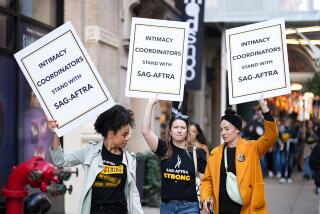SAG Urged to Reveal Complaints : Legal: Actress Charmaine Blakely, who fell victim to an agent’s sexual ‘casting-couch,’ has asked the union to change its disclosure policies.
- Share via
An actress and paralegal whose testimony helped convict a former Burbank talent agent of sexually assaulting 10 women has asked the Screen Actors Guild to change its disclosure policies so that members can check for complaints of this nature against agents and other professionals.
In a six-page letter to SAG President Barry Gordon, Charmaine Blakely’s lawyers accused the union of failing to take adequate steps to investigate Wallace Kaye, the former agent, or to protect future prospective clients, even after receiving numerous complaints against him.
A Pasadena Superior Court judge sentenced Kaye in June to five years and four months in prison. He was convicted in April of 10 counts ranging from felony sexual battery to false imprisonment involving nine aspiring actresses, including Blakely, and an undercover Glendale police officer posing as an actress.
Court testimony showed that the agent, who shut down his business in October, 1992, interviewed prospective clients behind locked doors, asking them to improvise sex scenes before fondling their breasts and genitals. “He’d grab them, lay on top of them and stick his tongue down their throats,” said Wayne W. Smith, one of Blakely’s lawyers. He said his client fell victim to Kaye’s “casting couch” during an October, 1991, visit to his office.
Shortly afterward, Blakely informed SAG of what happened and gave the union permission to use her name in any action it might take, according to her letter. Even so, Kaye continued to hold his SAG franchise until his business folded, she said. Agents, who are licensed by the state, must agree to a variety of regulations governing relations between actors and agents in order to win a SAG franchise.
SAG spokesman Mark Locher denied that the union had done anything improper but said that investigations are often impeded by victims’ request for anonymity. “We will carefully consider the suggestions of this member,” he added. “We take this matter very seriously.”
Smith, however, said SAG’s own files show that the union received at least seven signed written complaints as well as several oral complaints against Kaye dating back to June, 1990. Three complainants had authorized the union to use their name.
In the letter to Gordon, Blakely also asked the union to deny franchises to agents who have been convicted of a crime or found civilly liable for sexual harassment or sex offenses. Locher said an agent’s criminal history is checked before he or she can receive a state license.
More to Read
The biggest entertainment stories
Get our big stories about Hollywood, film, television, music, arts, culture and more right in your inbox as soon as they publish.
You may occasionally receive promotional content from the Los Angeles Times.










